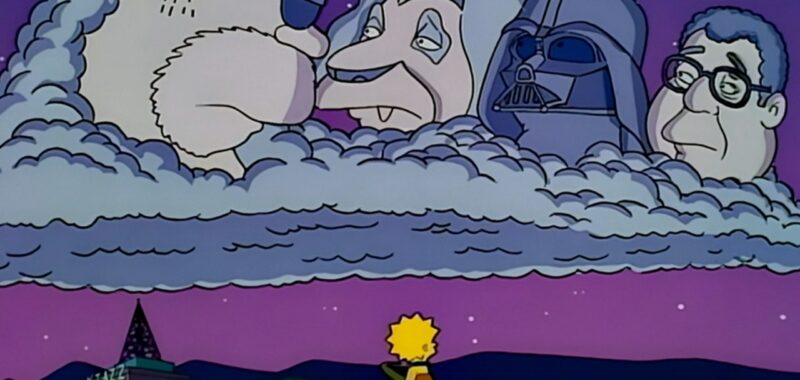You always knew it when you heard it: that booming, window-shaking bass, like the voice of God. Such was James Earl Jones, who died on Monday at the age of 93: a god among men in Hollywood, known to ears (and eyes) across the world for giving Darth Vader his imperious growl, and for making The Lion King‘s Mufasa sing with fatherly benevolence. These among so many stage and screen performances that will forever inscribe him in acting legend—from Field of Dreams to The Hunt for Red October and his Tony-winning part in 1987’s Fences.
There’s a lot to celebrate in such a distinguished career, but wow, that voice: safe, warm, familiar, and yet commanding, and authoritative. Basically, the archetypal dad. Hence why it was one of those celebrity deaths that genuinely felt like a punch in the gut when the news came through. When it did, I was watching The Simpsons. Strangely enough, it was one of the episodes for which he provided his voice.
Not least during its golden age—which most Simpsons-heads agree ranges anywhere between seasons one and nine, but no further than that—the show featured a ton of celebrity cameos. They were symbiotic: on the one hand, it was kind of a flex that a cartoon could recruit Michael Jackson to voice a guy in an asylum at his King of Pop heyday, or that it was Frasier himself who kept trying to kill Bart. At the same time, being on The Simpsons boasted the pop cultural cachet that any actor, musician, politician, filmmaker or other wannabe-zeitgeister craved. (This remains true, even as The Simpsons has become markedly less cool.)
Jones made his cameo debut in 1990, for the show’s first “Treehouse of Horror,” the now staple Halloween episodes that parody horror movies. He played parts in all three of the skits, told from the perspective of the Simpson kids: as a moving man in Bart’s first segment, which lampooned haunted house movies like The Amityville Horror; as one of the two drooling aliens in Bart’s second segment; and, most famously, he narrated Lisa’s reading of the Edgar Allan Poe story “The Raven.”
His voice fits Poe, making the already menacing prose sound more ominous. But on screen, Homer is running around in a robe, tormented by a raven that looks a lot like Bart. The contrast between “serious literary narrator,” which Jones embodies, and The Simpsons‘ trademark slapstick is what makes it all funny. His presence provided a booster shot of actorly credibility just as the show blossomed into a behemoth, just like Dustin Hoffman’s cameo as Lisa’s substitute teacher later on in season two.
His two other cameos are more fleeting, but they’re just as funny, mostly because of the out of nowhere “Hey, that’s James Earl Jones!” feeling they create. In 1994’s “Treehouse of Horror V,” he voices an alternate Maggie, who axes Groundskeeper Willie in the back—a running gag in the episode—before bellowing: “This is indeed a disturbing universe.” And then there was the episode I caught last night, 1998’s “Das Bus,” a loose parody of The Lord of the Flies in which the Springfield kids are marooned on a desert island and turn on one another over the sparse supply of snacks. Jones provides the closing narration, wrapping up the story with a parodic deus ex machina, explaining that the kids were rescued by “Oh, let’s say—Moe,” as if he’d pulled the bartender’s name out of his hat a second before.
Those appearances stand as a testament to Jones’s iconic, familiar status, such that he could boast such an impact—and provide a huge laugh—with just a line of throwaway dialogue. The show paid tribute to the actor once more, in the 1995 episode “Round Springfield,” where Lisa’s jazz mentor Bleeding Gums Murphy dies and appears to her in a cloud formation, referencing The Lion King. Extending the gag, three Jones characters appear next to him: Mufasa, Vader, and Jones (as the voice of CNN), bellowing their famous lines, albeit voiced by Simpsons regular Harry Shearer.
A still of the scene circulated on X soon after Jones’s death yesterday. In the show, it was a gag about an actor whose voice made him seem other-worldly and divine, which is exactly what Jones felt like.
This story originally appeared in British GQ.

